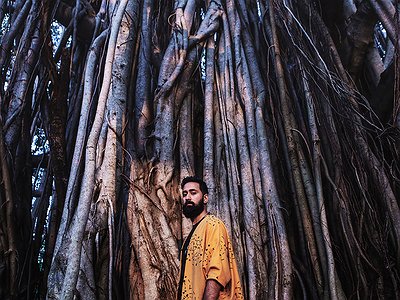Name: Sarathy Korwar
Nationality: US-born, Indian-raised, London-based
Occupation: Drummer, percussionist, composer, bandleader
Current release: Sarathy Korwar's KALAK is out via The Leaf Label.
If you enjoyed this interview with Sarathy Korwar, visit his official homepage for more information. He is also on Instagram, and Facebook. Or head over to our earlier Sarathy Korwar interview about improvisation.
The topics at the heart of KALAK have obviously been on your mind for quite some time. What was the concrete impulse to address them in the shape of this album?
I had been thinking about making a record like KALAK for a long time. There was no concrete impulse, but rather a slow churning of ideas over 2 years, where I let the ideas gestate until I ended up making KALAK.
You've mentioned Indofuturism as a source of inspiration for the album. Which sources/authors/ artists in particular left an impression?
Doing research on the theme lead me to artists and thinkers like Begum Rokheya, Rahul Sanskrityayan, Rajni Perera, Chitra Ganesh and more.
What wider implications has Indofuturism had for you?
Exploring ideas around indofuturism has meant questioning what makes this version of futurism, Indian? What are the concepts and philosophies that can be applied to futurism that are prevalent in Indian music, for example.
For me, the answer was thinking about time differently, in a cyclical, non-hierarchical way.
It makes you realise that the past-present-future no longer follows the same chronology. Each one affects the other deeply and we are linked to our ancestors and descendants more than we believe. The effect was to try and think of the creation of music differently. Without thinking about hooks, verses, choruses and simply being a meditation on smaller phrases, rhythms or notes. I believe this way of thinking. focussed our playing and changed our ability to create and improvise together.
Photay, who was an important collaborator on KALAK told me: “Music is one of the most effective ways to positively transform perspectives and break down boundaries across the world.” What role does music play in the imagining and creation of different futures?
Music, like with all art, is the closest thing we have to potentially break free from structural paradigms that enforce the way we think.
The power to speculate and dream about futures and the past is the most empowering thing music can do. It inspires alternate modes of thinking, seeing and hearing.
[Read our Photay interview]
Why is the idea of Utopia connected to settler colonialism as you put it in the press release?
When reading about the origin of the word ‘Utopia’ (Thomas More, 1566), I realised a eurocentric way of envisioning utopias was intrinsically liked to the vision of settler colonialism.
For example, finding new land - building a bridge - invading - renaming the land. They are both ways to build a utopia and to colonise.
I wanted to make this link evident, when we speak of utopias we must be aware of the colonial language that informs its origins and use these words carefully.
I do occasionally find “Utopian” thinking useful, as it can feed back fresh ideas into what you call “the daily struggle”. Can't both approaches mutually enrich each other?
Yes, I think both approaches must work together. Otherwise, you risk creating in a bubble that doesn’t apply to a community or people at large.
As with most things, a balance of both is what we need, and depending on our personality too, we might choose more of one or the other.
When you began work on KALAK, did you lay out your thoughts before the musicians prior to starting the sessions? How much discussion and communication was there before the music happened?
Yes, I had a lot of discussions with the band, mainly not about music but very similar to the things we are talking about right now.
I wanted everyone to be on the same page or at least understand my motivation for making this music. I think everyone did an incredible job and were very patient with me. (laughs)
I remember the session was a breath of fresh air because it was the first time we had all meant up since the lockdown in England had begun (the session was in August 2020). We felt a huge sense of hope and comfort, being around each other and making music. It was chaotic!
I recently did an interview about a new, interesting recording of Terry Riley's “In C” with the Young Gods. That piece has by now been performed by many different musicians from various countries and cultures, suggesting there is something universal about it. Do you personally find it interesting to look for these universals in music – and, if so, what could these be?
Yes, I believe there are some universals in music that I am always drawn to.
Mainly the idea of ‘surrender’ in music. To transcend one's own ego and individual self to feel like we’re part of something larger. I believe many folk musics around the world do this very well.




